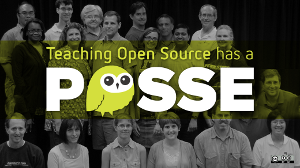Teaching Open Source is a community of practice centered around bringing the open source way into classrooms of all types.
Just getting started? Join the POSSE.

The Professors' Open Source Summer Experience (POSSE) is a cultural immersion workshop for faculty members who are interested in bringing the open source way into their classrooms. Learn more.
We're teachers, researchers, and open source practitioners from a wide variety of backgrounds and institutions from all over the world who believe that Free (Libre) and Open Source (FOSS) practices will profoundly transform learning communities in the next few years — and we're proud to be inventing that future right now in the schools, classrooms, and projects that we work in. If this sounds intriguing to you, we'd love for you to join us.
We share stories, swap projects and teaching materials, debate approaches, and ponder tough questions together on the mailing list that forms the heart of our community; introduce yourself there and we'll match you up with projects and people you might be interested in checking out. Many of us also blog and get together at events whenever we can, and we keep odds and ends on our wiki and chat in #teachingopensource on irc.freenode.net.
What does the open source way look like in academia?
What's the open source way?
The open source way is the set of practices and cultural norms shared by the majority of Free/Libre and Open Source software, hardware, and content projects ("open communities"). It includes such ideas as:
- Default to open.
- Release early, release often.
- Given enough eyeballs, all bugs are shallow. (Linus's Law)
- It's better to be disappointed than surprised. (Poelstra's Law)
- Begin with the finishing touches.
- ...and more.
One working definition is that the open source way is radically cross-functional, collaboratively constructed, realtime transparency -- but there are many other thoughts on the matter, and entire websites devoted to exploring this topic more broadly in education.
What are the benefits of practicing the open source way in education?
Most of us only started teaching open source within the past half-decade, so evidence is still largely anecdotal (we'd love help researching this more thoroughly; if you're interested, please join us and let us know).
What we have personally witnessed is that involving students from a wide range of backgrounds in Free and Open Source Software (FOSS) and open content communities gives them authentic learning experiences with real-world projects they can put on their public portfolios with no worries about industry confidentiality agreements. We've watched it dramatically increase intrinsic motivation, broaden participation demographics, and become the primary topic of conversation in job interviews. We've also seen our institutions benefit; the transparency of both artifacts and process contributes to an institution's public profile, and we also have researchers who've seen far broader awareness and participation in their work after opening up their projects.